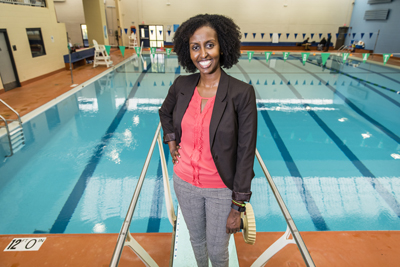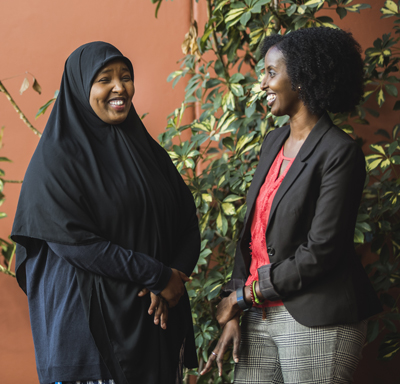
When Amira Adawe, MPH ‘15, immigrated from Somalia to Minnesota in 2000, she brought with her a life-long interest in serving her community through public health.
“I’ve been interested in public health since I was a child,” says Adawe. “My mother was a nurse-midwife and the head of the maternal and child health bureau in Somalia. I grew up hearing her talk about immunizations, family planning, and child health.”
In Minnesota, Adawe’s desire to support her Twin Cities Somali community grew. Her devotion led her to choose the School of Public Health, both for its great reputation and ideal location.
“It’s one of the top public health schools in the country and going here meant I could earn my master of public health degree (MPH) while still working in Minnesota and helping the Somali community,” says Adawe, who enrolled in the Public Health Practice MPH program to focus on policy and maternal and child health.
Minnesota is home to the nation’s largest Somali community. Many Somalis chose Minnesota because of its numerous refugee resettlement and social support organizations or to be reunited with family members who settled here before them.
Somali refugees often suffer from a range of illnesses, including nutritional deficiencies, intestinal diseases and depression, and are unaccustomed to the concepts and practices of preventative medicine. As a result, many health issues threaten the community.
While in school, Adawe identified and addressed a number of issues threatening the health of Somalis, including the use of dangerous skin-lightening creams by many Somali and African women.
“These women inherited the belief from the colonization of Africa that the lighter you are, the better,” says Adawe. “In Africa, having lighter skin means economic mobility, plus men are attracted to lighter-skinned women. Using the creams has become popular — including among some of my own relatives and friends.”
During a class on chemical exposure, Adawe was doing literature review and learned that the skin-lightening products often contain hydroquinone, which can cause birth defects if used by pregnant women.
The internationally produced creams are for sale in the Twin Cities and Adawe became concerned that they could harbor other toxic chemicals and poison people here. Adawe voiced her concerns to Ramsey county officials and received their support to gather cream samples and have them analyzed for dangerous ingredients.
The results were troubling: 11 of the 27 samples had extremely high levels of mercury, which is widely known to cause significant neurological damage in mothers and babies.
“When the products we tested showed high levels of mercury, agencies including the Minnesota Department Health, the Minnesota Pollution Control Agency, and the Food and Drug Administration (FDA) got involved,” says Adawe.
The FDA found that a single local seller was supplying the Twin Cities stores with the creams. It then issued a consumer warning stating that infants and small children might be exposed to mercury through parents who use the products.
Adawe also worked with the Department of Health to launch a biomonitoring study with HealthPartners and other organizations to screen some Hmong, Latina, Somali, and White women receiving prenatal care in Minneapolis and St. Paul for mercury, as well as lead and cadmium exposure.

Another issue Adawe saw among Somalis in Minnesota was an alarming amount of drownings.
Due to cultural and Islamic religious beliefs that require women to be fully clothed in public and avoid swimming with men, many women simply never swim and cannot teach water safety skills to their children.
“A lot of Somali kids don’t know how to swim and they won’t learn anywhere else because of the lack of swimming lessons in schools,” says Adawe.
In an effort to change this, Adawe formed a unique partnership between the City of St. Paul’s Police and Parks and Recreation departments, and local mosques. Together, they created a female-only swim program where Somali and Muslim women and girls get exclusive use of St. Paul’s Oxford Community Center pool, and staff it with female lifeguards and instructors. The St. Paul Police provide free transportation from the mosques to the pool.
“The program gives me somewhere I can exercise and feel the freedom of swimming in whatever I want to wear,” says participant and mother-of-two Amina Aden. “It also gives my kids the opportunity to learn to swim, which is a life skill that will help keep Somali kids from drowning.”
Toxic skin creams and drownings are just two of the many public health problems facing Minnesota’s immigrants. Today, Adawe is working to address many more as a legislative liaison for the Minnesota Department of Health. “The work I do on a daily basis impacts the entire state,” says Adawe, who helps develop public health proposals and explain them to legislators. “Policies can make huge changes in public health.”
Even with her successes, Adawe knows it’s going to take more than just herself to tackle the public health issues facing Minnesota immigrant communities. To attract more Somali-Americans to public health, she informally mentors high school and college students to kindle their interest.
“I do a lot of health education in the community and so people know me,” says Adawe. “I try to guide students interested in public health based on their concerns and interests, and help them find opportunities, like internships with county health departments.”
Adawe has also been consulting with educators about creating formal pathways for Somali students to enter public health graduate programs, and later, move into the workforce.
For Adawe, public health is an area where the opportunity to do good abounds. “If you’re excited about solving problems and you have the right tools, it’s endless what you can do in public health.”
